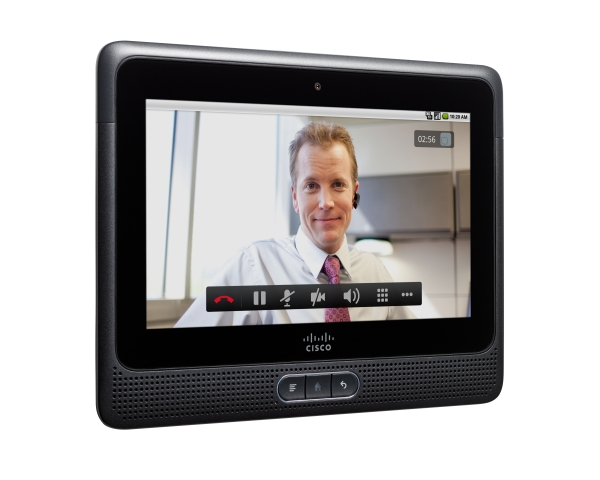 Cisco today unveiled AppHQ, a white-label app store service for enterprises designed for its Cius enterprise tablet computer.
Cisco today unveiled AppHQ, a white-label app store service for enterprises designed for its Cius enterprise tablet computer.
AppHQ will basically serve as an app store for an individual enterprise. Systems administrators can manage which apps appear on an AppHQ store and which devices can download them. Each AppHQ is a custom-branded app store for a single enterprise, where employees can develop and publish applications. IT managers can also select any of the 200,000 plus Android apps in the Android app store and include them in an AppHQ store.
Every application that goes through an AppHQ store goes through Cisco validation testing — regardless of whether it’s developed by a business, a third-party Android developer or an employee within the company. Cisco will deploy a large number of apps that can be distributed to every AppHQ store. The Cius will also have access to all of Cisco’s major services like online meeting service WebEx, its collaboration service Quad, its Jabber messaging system and the video conferencing service TelePresence.
Cisco will have its own “master” AppHQ store that Cius owners can access to download applications developed specifically for the Cius. But systems administers can still determine which applications users can download from Cisco’s own AppHQ store.
The Cius is not a consumer tablet. It’s built exclusively for enterprise use, compared to some other tablets that are designed with consumers in mind but are widely deployed in the enterprise. The iPad 2, for example, is one of the most popular devices in the enterprise but was designed for consumers. Still, the Cius was designed to “appear” like the device has consumer choice with access to Android applications, according to Cisco. One interesting device quirk that will be useful for enterprise users is the ability to change out batteries in the device. The Cius is designed to run for around eight hours, but users can change out the battery and extend the life of the device.
Cisco is putting a lot of focus on giving IT managers and systems administrators control of the device. Administrators can control just about every aspect of the tablet, down to the ability to wipe the tablet remotely if it’s compromised. Larger companies, like those on the Fortune 500 list, demand those kinds of security features in smartphones and tablet computers because of internal regulations.
Cisco’s enterprise tablet runs on Google’s mobile operating system, Android. The company announced today that the Cius goes on sale July 31 and will cost $750, compared to the $500 price point of most tablets on the market. The Cius was announced nearly a year ago, but details about a launch date and price have been scarce.
AT&T announced that it will be selling the device, which will take advantage of its HSPA+ 4G network, this fall. Cisco will also launch a 4G version with Verizon Wireless.
![]() We’ll be exploring the most disruptive mobile trends at our fourth annual MobileBeat 2011 conference, on July 12-13 at the Palace Hotel in San Francisco. It will focus on the rise of 4G and how it delivers the promise of true mobile computing. We’re also accepting entries for our mobile startup competition at the show. MobileBeat is co-located with our GamesBeat 2011 conference this year. To register, click on this link. Sponsors can message us at sponsors@venturebeat.com.
We’ll be exploring the most disruptive mobile trends at our fourth annual MobileBeat 2011 conference, on July 12-13 at the Palace Hotel in San Francisco. It will focus on the rise of 4G and how it delivers the promise of true mobile computing. We’re also accepting entries for our mobile startup competition at the show. MobileBeat is co-located with our GamesBeat 2011 conference this year. To register, click on this link. Sponsors can message us at sponsors@venturebeat.com.


